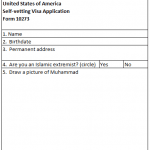I’ve got to be honest with you; I’m pretty disappointed with what I’ve been reading over the course of the day (sorry, no links). Yes, various candidates have condemned Trump’s call for a halt to entry by Muslims into the United States, but pundits and conservative commentary sites are saying something rather different: “sure, I wouldn’t go as far as Trump, but he raises some good points.”
Basic rule of thumb:
The rules are different for a Presidential candidate. You can’t just throw out ideas to chew on, in the way that a Rush Limbaugh might. You can’t just make “heat of the moment” statements, or make outlandish suggestions, like a blogger might (I know, I’ve started many a post with “just spitballing here but . . .”). Because any such statement — especially, say, a press release (!) — is a policy proposal.
And even if you want to throw out outlandish ideas, stick to things like abolishing the fed, or going back to the gold standard or the like, please. Because here’s a Red Line for outlandish ideas: even as a discussion-starter, you don’t get to propose policies that are unjust.
Now there’s nothing particularly unjust about vetting prospective immigrants or visitors from countries connected with terrorism, or who have visited such countries. It’s also wholly reasonable to restrict immigration from particularly countries. And it’s perfectly fine to exclude those individuals from entry who support terrorism, who support violence in the name of Islam, who support sharia-type punishments for apostasy, adultery, blasphemy, who require women to not just wear a headcovering but cover their entire faces, or who have connections and relationships that suggest they may support these things.
And I know the rationale for a total Muslim ban is that it’s too difficult to differentiate between moderate and extremist Muslims, so the only surefire way to prevent extremist Muslims from entering the country is to ban them all. There have also been discussions on sites like National Review Online concluding that Congress has every right to control who is allowed to enter the country, and that there’s no law to prevent them from differentiating by religion.
But there’s more at stake than what’s legal or not, what’s constitutional or not.
Is it just?
It is unjust to exclude moderate Muslims from travelling to the United States, even for business or professional reasons.
And it is unjust in the way we respond to Muslims in America, to treat them as tainted, poisoned — not just the extremists but even the cheerful young pharmacy technician at the grocery store, her hair loosely covered.
Yes, it’d be easier to say, “no Muslims”, but it would be unjust.
I’m not a fool. I’ve seen the reports that unpleasantly large numbers of Muslims hold extremist beliefs, and that even many of those who claim to seek peace still believe that “of course” peace is only possible if Jews leave Israel. I know likewise about the “sword verses,” and I’ve read often enough about the fact that Muslim tradition says that later-written verses abrogate earlier-written verses, and that the “sword verses” urging violence were written after the verses proclaiming tolerance — following the history of the community, first seeking converts, then gaining military power. I also know that Islam is not just built on one’s personal interpretation of the Quran, but calls on its followers to observe the teachings of the hadiths, and the “chain of transmission,” and that the major Islamic schools in the Middle East, the closest Islam’s got to a pope, all line up in support of some things we in the West find rather objectionable. I’ve read Ayaan Hirsi Ali, for instance, and similar writings, and I pop over to The Gatestone Institute periodically.
I also agree that those who say, “Islamic State is not Islamic,” are fools. Back when Obama was making this pitch in February, his premise really seemed to be a sort of logical deduction: “All religions are about a loving God and being good to others. Islam is a religion. But Islamic State is evil. Therefore, Islamic State is not a religion, and is cannot be Islam.” (See my post at the time.) But that’s nonsense, for us as outsiders to imagine that we know better what is and isn’t Islam, rather than recognizing that there are different kinds of Islam and we cannot be the ones admitting or excluding groups from that definition. Certainly, Muslims themselves define who they are by whether you’ve made a profession of faith, just as Christians define ourselves likewise by our professions of faith.
But here’s the opinion that got me blocked from commenting at National Review*: we are getting so focused on the extremism that we’re seeing that too many are rejecting the very possibility of Muslims who are peaceful.
(* Yes, indirectly. This was back in January; details here.)
And there are others who believe in a different kind of Islam. Even just a quick check of the Patheos Muslim channel produced this post, about a declaration of a Muslim Reform Movement. Though these groups are small, they deserve our support; particularly since the largest number of Muslims allow traditionalist groups such as CAIR and the Muslim Student Association to speak for them simply because they don’t know of an alternative way to practice their religion, or don’t have an alternative local community.
Trump’s Muslim moratorium, and those who support it, and those who waffle about it and say things like “gosh, I wouldn’t go that far but. . .” but still treat it as a reasonable part of political discourse? The whole thing is a slap in the face to those whom we ought to be supporting.
UPDATE: I’ve flogged this piece on twitter a bit. Disappointed in the reactions: again and again, an insistence that there are not, and never could be, any reform-minded Muslims, so we can discard them entirely, rather than allying with them.













